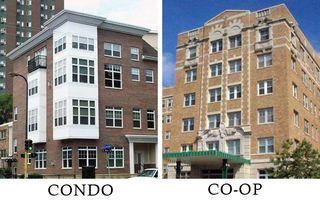 You can't tell whether a property is a condo or a co-op by looking at it. Both condos and co-ops can be old or new... and are both 'apartment units' in a shared building with common spaces and shared amenities. However, the forms of ownership are completely different.
You can't tell whether a property is a condo or a co-op by looking at it. Both condos and co-ops can be old or new... and are both 'apartment units' in a shared building with common spaces and shared amenities. However, the forms of ownership are completely different.
When you buy a condo you are buying a piece of real estate. For legal purposes it is the same as owning a house. If you finance your purchase it is secured by a real estate mortgage.
- You own the 'air space' of your unit... you own real estate property, just as you would a private house
- You also own an undivided percentage of the common elements and amenities of the building along with the other unit owners
- It is governed by an association of the unit members who elect a board of directors to oversee maintenance and enforcement of rules and regulations
- You pay monthly association fees determined by the association which include things such as: building exterior and common area maintenance, hazard insurance for the building and common areas, heating, professional management, sanitation, security system, shared amenities such as party room/pool/exercise equipment, snow/lawn care, water/sewer
When you buy a co-op you are buying shares in a corporate entity whose assets include the building in which you will live. Typically you then enter into another agreement giving you the right to occupy 'your' unit as long as you pay your monthly assessments. Because you don't own any real estate, financing is through special co-op financing rather than a traditional mortgage.
- You don't own your unit
- You own shares in a corporate entity that owns your building with the contractual right to occupy your assigned unit
- Your initial purchase price may be less than for a condo of comparable size but monthly fees may be higher; co-ops may limit the amount that shares for a unit may appreciate in value when it is sold
- Your monthly association fees are typically higher than those for a condo because it may also include an underlying mortgage for the property held by the corporation as well as more common property and maintenance; for example, the corporation may own all the appliances in the units which they maintain or replace as needed
- It is governed by a board of directors, who frequently must approve any sale... you may even have to meet the other cooperative owners and be approved by them before buying into the co-op
In the Twin Cities area, senior co-ops for age 55+ are the most common form of cooperative living. It is fairly common for sales of these senior co-ops to be handled by the complex itself, so there may be more co-op units available for sale than are listed in the MLS.
Sharlene Hensrud, RE/MAX Results - Email - HomesMSP.com



COMMENTS ( 2 )
posted on 14 September at 03:00
Hey! This post couldn't be written any better! Reading this post reminds me of my old room mate! He always kept chatting about this. I will forward this article to him. Pretty sure he will have a good read. Thank you for sharing!
posted on 13 September at 13:51
Hello mates, how is the whole thing, and what you would like to say concerning this post, in my view its genuinely remarkable in support of me.